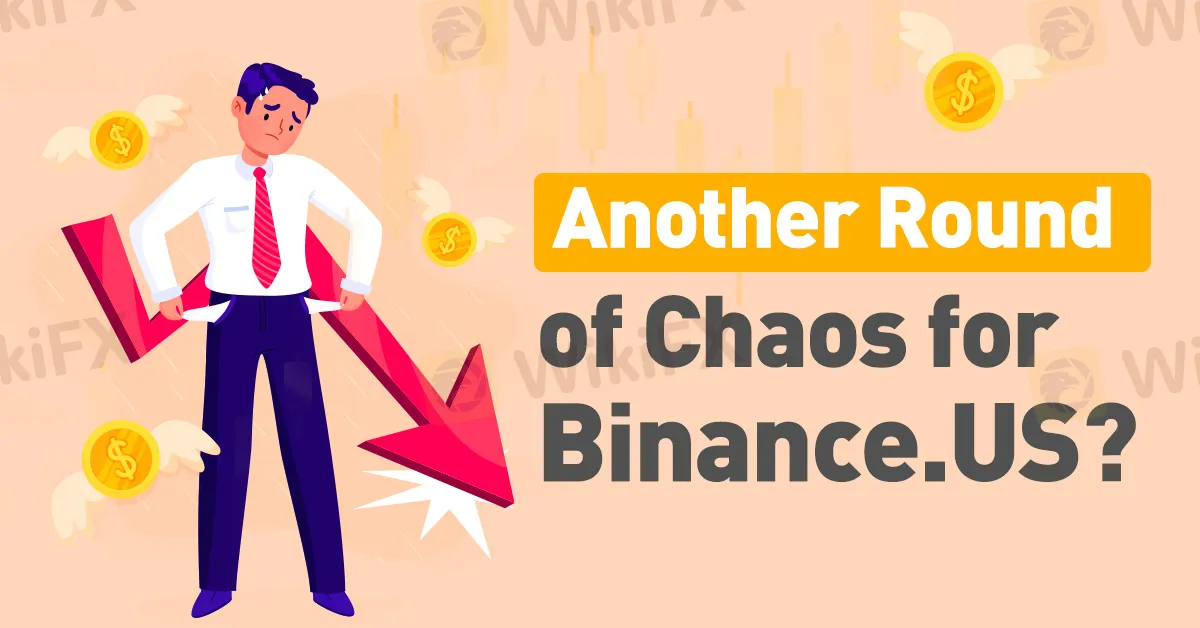简体中文
繁體中文
English
Pусский
日本語
ภาษาไทย
Tiếng Việt
Bahasa Indonesia
Español
हिन्दी
Filippiiniläinen
Français
Deutsch
Português
Türkçe
한국어
العربية
Another Round of Chaos for Binance.US?
Abstract:Binance.US, the American arm of the global cryptocurrency exchange, has ceased direct US dollar withdrawals due to regulatory pressure from the SEC, requiring users to convert their holdings into stablecoins or digital assets for withdrawals, marking a significant shift in their operations.

Binance.US, the American arm of the global cryptocurrency exchange Binance, has taken the significant step of discontinuing direct US dollar withdrawals from its platform. This strategic decision is in response to a series of regulatory measures implemented by the US Securities and Exchange Commission (SEC). Consequently, Binance.US users are now required to exchange their US dollar holdings into stablecoins or other digital assets if they wish to initiate a withdrawal.
The announcement of this pivotal change was made through the revision of the exchange's terms of use, which officially came into effect on the preceding Monday. It's noteworthy that, prior to this update, US dollar deposits held within Binance.US user wallets enjoyed the protection of FDIC insurance. However, the revised terms have rendered this safeguard inapplicable.
Binance.US informed users that as a result of these revisions, their accounts and digital assets no longer qualify for FDIC insurance protection. To withdraw US dollar funds from their accounts, users are now required to convert these funds into stablecoins or other digital assets, which can subsequently be withdrawn.

Back in June, Binance.US, the United States-based affiliate of the global crypto exchange, initiated a suspension of USD deposits, accompanied by notifications to its user base regarding the imminent cessation of fiat withdrawal channels. The exchange asserted that this measure was taken with the primary aim of ensuring the security and stability of its customers and the platform, given the mounting regulatory apprehensions.
The backdrop to this development is the ongoing legal dispute involving Binance.US, its international parent entity, Binance, and its Founder, Changpeng Zhao, who are currently embroiled in a lawsuit filed by the SEC on June 5. The SEC's allegations revolve around the operation of unregistered securities platforms by these entities and Zhao.
Binance.US communicated to its users that the SEC's “exceedingly assertive and coercive tactics” were the catalyst behind the suspension of dollar deposits. This unwavering regulatory pressure had cast a shadow of doubt over the exchange's banking partners, causing them to be increasingly cautious about their involvement with the cryptocurrency sector. Furthermore, Binance.US cautioned that its banking partners had signalled their intent to halt dollar withdrawals as early as June 13.
The month of June also witnessed Binance.US making the decision to suspend its OTC Trading Portal services. In addition, the exchange opted to delist ten cryptocurrency trading pairs that were linked to Bitcoin and Binance USD from its platform. It is worth noting that a number of these trading pairs experienced substantial declines in value following the SEC's legal actions, resulting in a significant reduction in the overall variety of trading pairs available on the crypto exchange.
Fast-forward to September, the SEC escalated its ongoing legal confrontation with Binance.US, petitioning a court in Washington, DC, to grant authorization for an extensive examination of the exchange's asset custody services. This development occurred as the regulator amplified its assertions that Binance.US had displayed a lack of cooperation in furnishing the requested documents, further intensifying the regulatory standoff.

Disclaimer:
The views in this article only represent the author's personal views, and do not constitute investment advice on this platform. This platform does not guarantee the accuracy, completeness and timeliness of the information in the article, and will not be liable for any loss caused by the use of or reliance on the information in the article.
Read more

Which Currency Pairs are Most Commonly Traded in India?
Currency pairs play a crucial role in forex trading. To effectively participate in the forex market, it's important to understand which currency pairs are most relevant in your country. For traders in India, knowing the actively traded currency pairs is essential.

Future of Forex in India: Growth or Global Domination?
Every Trader or Investor in India who wants to invest in the dynamic forex market must read this important article. It explores the future of the forex market in India and answers a common question: Forex market will rise or crash in India ? Checkout the article below.

Bitget Lists Caldera for Spot Trading | What Should You Know?
Bitget, a cryptocurrency exchange and Web3 company, has listed Caldera (ERA) for spot trading. Caldera is a rollup platform built on Ethereum. It is designed to allow horizontal scaling and interaction between different rollups.

Dubai Police Arrests 4 People in Connection with High and Quick Profits Online Trading Scam
Dubai Police have arrested four individuals involved in defrauding many investors via fake online trading schemes that promised high and quick returns. Check out the arrests, international connections, and more in this story.
WikiFX Broker
Latest News
Euro zone inflation holds steady at higher-than-expected 2% in July
Forex Success Stories: Lessons You Can Use to Win
Scam Alert: FCA Issued Warning! Check the List of Unauthorized Brokers Below!
FCA Forex Trading Regulations Explained – What Every Trader and Broker Must Know
FIBO Group: A Closer Look at Its Licenses
Making Money with Forex Weekend Trading
FCA Issues New Alerts Against Unlicensed Financial Platforms, Including Clone Scams
The Untold Story In Today's Jobs Report: The Unprecedented Purge Of Illegal Alien Workers
Aetos relinquishes FCA license to focus on Australia, offshore
Scam Surge in Sarawak: Losses Soar to RM77.7 Million in Just 7 Months
Currency Calculator


